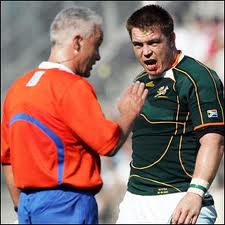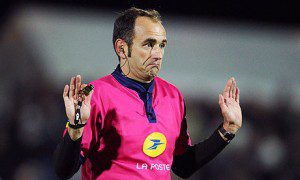
 After being lost in the outback, Australia’s Working Class Rugger is back!
After being lost in the outback, Australia’s Working Class Rugger is back!
WOLLONGONG, AUSTRALIA: This headline query – Two Refs for Rugby: Yay or Nay? – isn’t exactly as new as the new year… In fact it surfaced last November via a South African rugby magazine, but following it up nonetheless provides an interesting proposition to ponder for rugby fans and players alike.
In the upcoming Varsity Cup, South Africa’s premier University Championship the SARU, will be actively trialling the use of a two-ref system – as opposed to the stock standard and highly contestable one-ref system rugby has traditionally employed. It will offer and interesting study into a field that fans are often left lamenting and disputing well beyond the final whistle. But you have to question, considering the scope for ref’s to apply individual interpretation to the laws as is, if the addition of a second ref will only serve to further confuse the situation, leading to even slower game play, more penalties and less ball in play.
Some evidence came from the lower Maties Koshuis Leagues, where the games run for 60 minutes. In that league, the average time in play for the ball totals 47 minutes, and the average penalty count tops a mere 4 per game. So the answer there appears to be a resounding no. And rest easy, there was no added confusion.
Indeed it could be a boon for the game from a spectator’s perspective and if successful, the next great leap forward for the game could come from one of the nations that helped thrust the game into the professional realms once again.
 It’s little known, but South Africa has been rugby’s petri dish for some time now when it comes to trialling new variations and interpretations that may or may not be later ratified by the IRB (International Rugby Board). It’s where the IRB chose to implement the infamous ELV’s (Experimental Law Variations) or Stellenbosch Laws. Ironically, despite all the protestation about the ELVs from the Northern Unions (the Six Nations unions), many have become common place in the professional game today. Contrary to many individual perceptions, South Africa is a rather progressive rugby nation.
It’s little known, but South Africa has been rugby’s petri dish for some time now when it comes to trialling new variations and interpretations that may or may not be later ratified by the IRB (International Rugby Board). It’s where the IRB chose to implement the infamous ELV’s (Experimental Law Variations) or Stellenbosch Laws. Ironically, despite all the protestation about the ELVs from the Northern Unions (the Six Nations unions), many have become common place in the professional game today. Contrary to many individual perceptions, South Africa is a rather progressive rugby nation.
 We’ll be looking on with great interest as to the results of the tria,l as the refereeing of the game is a real bugbear of mine, personally. Rugby is a game of continual flow, one that to the initiated, is plainly simple but with the endless element of the contest and positioning. A task that could easily be assessed as too much for just one man in the middle to maintain at all times. Some may suggest that this is the role of the assistant referee’s running the sideline but it’s become clear that the additional judicial powers handed down to them by the IRB several years ago hasn’t borne fruit, with many often overlooking the major issues – only to slow the game down by highlighting the smaller more inconsequential elements.
We’ll be looking on with great interest as to the results of the tria,l as the refereeing of the game is a real bugbear of mine, personally. Rugby is a game of continual flow, one that to the initiated, is plainly simple but with the endless element of the contest and positioning. A task that could easily be assessed as too much for just one man in the middle to maintain at all times. Some may suggest that this is the role of the assistant referee’s running the sideline but it’s become clear that the additional judicial powers handed down to them by the IRB several years ago hasn’t borne fruit, with many often overlooking the major issues – only to slow the game down by highlighting the smaller more inconsequential elements.
So, while it strikes at the core of the game for traditionalists, here’s the question to you, Jane & John Q. Fan: Two Refs for Rugby: Yay or Nay?
Feel free to comment below, look for and “Like” our Facebook Rugby Wrap Up Page and follow us on Twitter @: RugbyWrapUp, Junoir Blaber, DJ Eberle, Nick Hall, James Harrington, Cody Kuxmann, Jaime Loyd and Declan Yeats, respectively.

